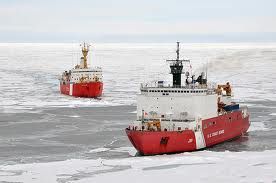
Arctic sea ice is melting at a near- record pace, opening shipping lanes for cargo traffic between Europe and Asia, Russia’s environmental agency said.
Ice cover is close to a record low, opening “almost the entire northern sea route to icebreaker-free shipping” as of early August, the Federal Hydrometeorological and Environmental Monitoring Service said on its website today.
The so-called ice extent is as much as 56 percent less than average in some areas, allowing “very easy” sailing that will persist through September, the Moscow-based service said.
Melting ice is making it easier for Russian and other European shippers to service Asia via the northern sea route, which is about one-third shorter than the Rotterdam-Yokohama voyage through the Suez Canal, saving time and fuel. Iceland’s President Olafur Ragnar Grimsson said last year that the pace of global warming in the Arctic was three-times faster than elsewhere, cutting journeys between Asia, Europe and America by as much as half.
Melting occurred “at a rapid pace through the first half of July and is now tracking below the year 2007, which saw the record minimum,” the U.S. National Snow and Data Center said on its website July 18.
Soviet-Era Passage
Three of sixteen groups of oceanic scientists expect the extent to break the record low of 4.14 million square kilometers (1.63 million miles) reached on Sept. 16, 2007, the Fairbanks, Alaska-based Arctic Research Consortium of the U.S., or Arcus, said on its website. That compares with about 6.86 million square kilometers now, according to Russia’s environmental agency.
Prime Minister Vladimir Putin has vowed to transform the Soviet-era Arctic route, first plied in 1932 between Arkhangelsk and the Bering Strait, into a year-round passage and commodity producers including OAO GMK Norilsk Nickel, OAO Novatek and EuroChem have already starting sending test shipments. The route is currently used, with the help of icebreakers, from July to November.
The North Pole may be completely ice-free in summer within a few decades, rather than by 2080, a prediction made by the Intergovernmental Panel on Climate Change, Russia’s chief forecaster, Alexander Frolov, said last year.
Source: Bloomberg
We use cookies to improve your experience. By continuing to use our site, you accept our Cookies, Privacy Policy,Terms and Conditions. Close X